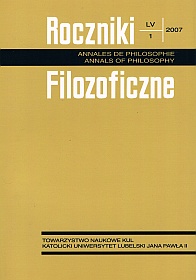Logical and Philosophical Problems Connected with Fuzzy Logic
Abstract
In the article it is shown that fuzzy logics are an interesting attempt at reflecting in a formal system of “uncertainty” or “vagueness” that are sometimes encountered in human reasoning. However, they sometimes have a high price. The truth loses its traditional precision and objective quality for the benefit of intuitive and subjective opinions.
The article tries to present cross-sectionally the way in which the concept of fuzziness exists in various fields. Fuzzy sets are characterized, in which the concept is shown in the most distinct and at the same time simple way. Then various aspects are shown of the issue of the ability to construct fuzzy logics. Attention is paid both to formal and semantic problems that appear in the fuzzy logic. S. Haack’s critical attitude towards fuzzy logics and J. Fox’s definition of the problem that is polemic towards it are presented, and especially his conception of the importance of the truth. This conception is an interesting attempt at harmonizing S. Haack’s critical remarks with the idea of fuzziness found in L.A. Zadeh’s works. In applications of fuzzy logic objective and subjective data are differentiated, to which this logic applies. Finally, attention is paid to extreme dissimilarity between the philosophical assumptions guiding L.A. Zadeh and authors of classical logic.
References
Almond G. R.: Discussion: Fuzzy Logic: Better Science? Or Better Engineering?, „Technometrics” 37 (1995), No. 3, s. 267-270.
Bellman R.E., Zadeh L.A.: Decision-Making in fuzzy Environment, „Management Science” 17 (1970), No. 4, s. 141-164.
Fox J.: Towards a reconciliation of fuzzy logic and standard logic, „International Journal of Man-Machine Studies” 15 (1981), s. 213-220.
Gottwald S.: Fuzzy propositional logic, „Fuzzy Sets and Systems” 3 (1980), s. 181-192.
Haack S.: Do We Need ‘Fuzzy Logic’?, [w:] taż, Deviant Logic, Fuzzy logic: Beyond the Formalism, Chicago–London: University of Chicago Press 1996, s. 232-242.
Haack S.: Is Truth Flat or Bumpy?, [w:] taż, Deviant Logic, Fuzzy logic: Beyond the Formalism, Chicago–London: University of Chicago Press 1996, s. 243-258.
Kacprzyk J.: Zbiory rozmyte w analizie systemowej, Warszawa: PWN 1986.
Kleene S. C.: Introduction to Metamathematics, New York: Van Nostrad 1952.
Kundu S., Chen J.: Fuzzy logic or Lukasiewicz logic: A clarification, „Fuzzy Sets and Systems” 95 (1998), s. 369-379.
Lakoff G.: Hedges: a study in meaning criteria and the logic of fuzzy concepts, Chicago: University of Chicago Linguistics Department 1972.
Pavelka J.: On fuzzy logic I, II, III, „Zeitschrift für Mathematische Logik und Grundlagen der Mathematik” 25 (1979), s. 45-52,119-134, 447-464.
Rips L. J., Shoben E. J., Smith E. E.: Semantic distance and the verification of semantic relations, „Journal of Verbal Learning and Verbal Behavior” 12 (1973), s. 1-20.
Rosch E. H.: On the internal structure of semantic and perceptual categories, [w:] Cognitive Development and the Acqusition for Language, ed. T. E. Moore, New York: Academic Press 1973, s. 110-144.
Zadeh L. A.: Fuzzy sets, „Information and Control” 8 (1965), No. 3, s. 338-353.
Zadeh L. A.: The concept of a linguistic variable and its application to approximate reasoning – I, II, III, „Information Sciences” 8 (1975), s. 199-249.
Zadeh L. A.: Commonsense reasoning based on Fuzzy Logic, „Preceedings of the 1986 Winter Simulation Conference”, ed. J. Wilson, J. Henriksen, S. Roberts.
Zadeh L. A.: Probability theory and fuzzy logic are complementary rather than competitive, „Technometrics” 37 (1995), No. 3, s. 271-276.
Copyright (c) 2007 Roczniki Filozoficzne

This work is licensed under a Creative Commons Attribution-NonCommercial-NoDerivatives 4.0 International License.





